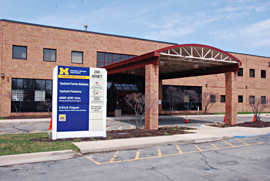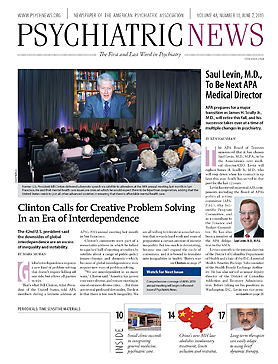As psychiatrists around the country explore ways to bring psychiatry closer to primary care, a modest family practice clinic in Ypsilanti, Mich., may provide one glimpse into the future.
“We do consultations and make recommendations to the family practitioners for initial management and ongoing care,” said Patrick Gibbons, D.O., an attending psychiatrist with the University of Michigan Health System and the Washtenaw County Health Organization, the local community mental health center.
“Our goal is to get the patient back to the primary care physician with very explicit directions about what symptoms to monitor, which medications to use, and when to call us if there’s a problem,” said Gibbons in a recent interview in his office at the family practice clinic in the Ypsilanti Health Center.
Essentially, Gibbons and his University of Michigan colleague, child psychiatrist Sheila Marcus, M.D., run a consultation service, assisted by psychiatry residents, a fellow, and some medical students.
Residents and medical students spend one day a week in the clinic for two to six weeks. They’ll see a patient and do an initial evaluation, review observations and recommendations with Marcus or Gibbons, then see the patient again along with the attending physician.
Their goal is to have the medications titrated and stabilized within three visits. Follow-up interactions with the family practitioners usually happen over the phone or by e-mail or with the family medicine residents in person at Wednesday afternoon meetings.
“We serve two populations,” explained Gibbons. “First, there are the people in the county who do not otherwise have mental health services. Second, there are patients whose cases are too complex to be handled by family medicine clinicians alone.”
Gibbons and Marcus usually review cases with the residents, going over symptom clusters, medication management, psychosocial issues, legal issues, or chemical use disorders.
“What’s unique here is that every patient already has a primary care physician that we can easily contact,” third-year psychiatry resident Cara Fosdick, M.D., told Psychiatric News. “They have a regular provider, and we have the opportunity to educate the primary team.”
Having services available in the family medicine clinic helps overcome many patients’ hesitation to accept psychiatric care, said another PGY-3, Lubna Grewal, M.D.
“That resistance is diminished because the patients know we’re working with their regular doctor,” said Grewal. “It’s a great way to loop around that kind of stigma.”
Many of their patients are struggling economically and face more psychosocial crises than those they see in the university clinic. Many also deal with chronic pain, a fact that brings home to the residents the interaction between psychiatry and general medical care.
“Our residents and fellows become sensitized to the reality of how payment for services, selection of medications, and treatment alternatives are directed by financial situations or social barriers,” said Gibbons.
Managing complications means using lines of communication set up in advance to contact the psychiatrists and residents. In emergencies, the primary care team knows to send the patient to the psychiatric emergency departments at two hospitals in Ypsilanti or nearby Ann Arbor.
“This is probably a very realistic experience for those who will be treating general psychiatric conditions in the community,” said Gibbons. “It also gives med students who might be interested in psychiatry a taste of what the real world is going to be like.”
A didactic program designed to teach the family practice residents more about general mental health issues and treatment strategies is in the planning stages.
Work in the clinic so far appears to benefit both patients and trainees.
“It feels like we’re doing a lot of useful work here in a comparatively small amount of time, compared to the average clinic,” said Fosdick. ■

